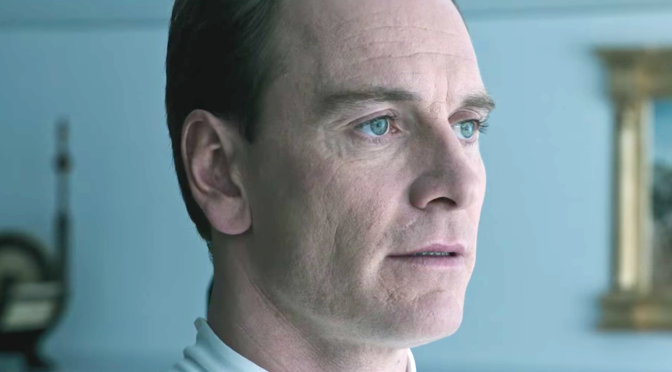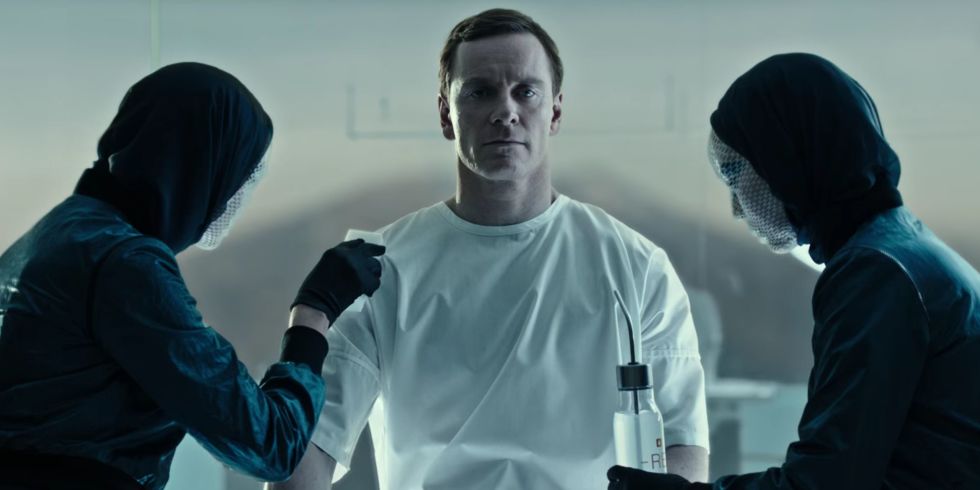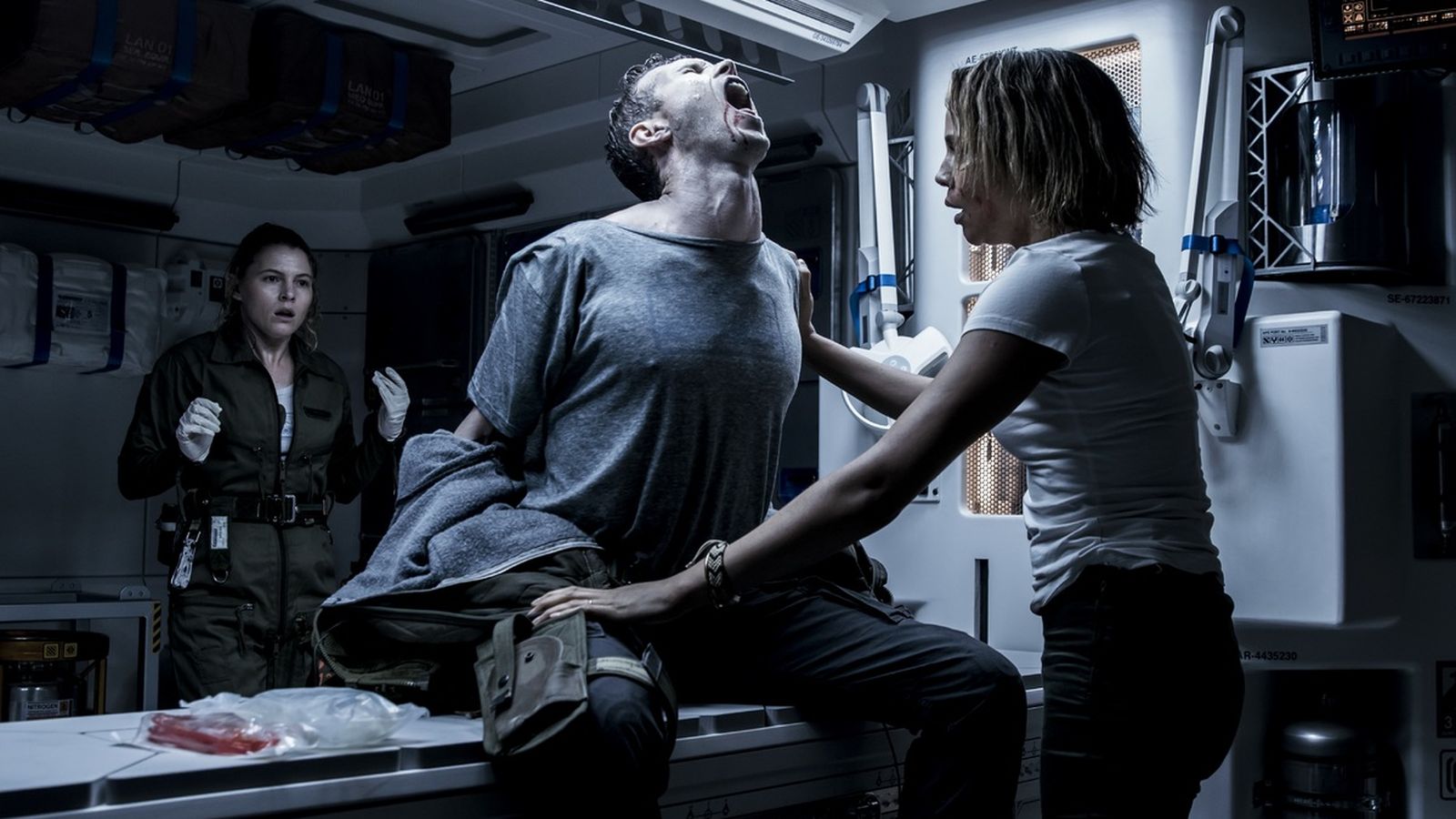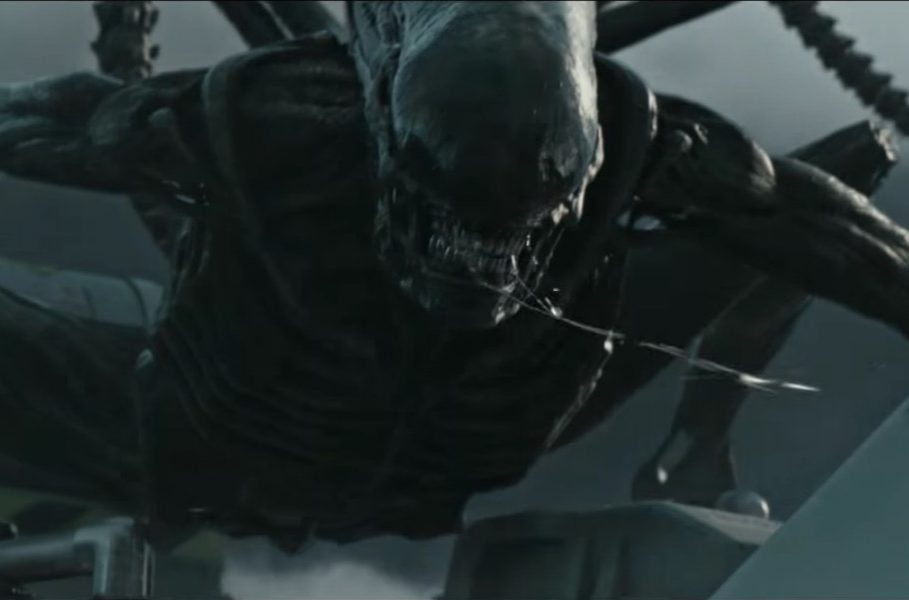
It’s not uncommon to see “Prometheus” on the list of the biggest cinematic disappointments, and for a very good reason. It had everything going for it, all signs pointed to something special, and it was an origin story of the classic Xenomorph creature, directed by the man who introduced us to this creature two decades before.
Ridley Scott returned to this world, to the genre of science fiction, the same genre in which he created two unforgettable films, and he promised something special. The trailer was a nice send-back to the original creepy trailer; it had the same ominous alarm of the Nostromo spaceship, as well as the sense of doom of dealing with an unknown threat that goes beyond our greatest nightmares.
Sadly, as most of us know, it was a bit of a mess. While there are a lot of great things about the movie, such as the visuals and Michael Fassbender’s performance, it was ultimately an extremely frustrating viewing experience.
You see beautiful images with a fascinating story with an incredible cast, but with massive plot holes and unanswered questions, not to mention poor characterization. The worst thing was that it was supposed to return the honor to the classic Xenomorph, a classic monster whose presence has been squandered through numerous films. Surely Scott could bring the glory back to this acid-breathing dragon?
Granted, an earlier genus of the Xenomorph appeared at the end for barely a minute. But the story wasn’t about the Xenomorph at all; it was about the engineers, though their purpose and the origins of their menace is never explained, only hinted at. The existential themes were not squandered, thanks to the lame penmanship of a certain Damon Lindelof.
Yet, Scott will return to this world once again with “Alien: Covenant”; declining to make a sequel to his other classic science-fiction contribution, “Blade Runner”, Scott instead wanted to complete this story. Two trailers have been released and all of them look great, yet many are skeptical, and for good reason.
“Prometheus” is still fresh in anyone’s mind and despite some of the visual flourishes and the return of the characters, this looks like it will take a more traditional route. However, I believe, to the faith of the director, that it might redeem “Prometheus” and the Alien franchise on a whole. Naturally, I might be very wrong about this, yet I hereby share my reasons for this anyway.
I hope that anyone skeptical might feel a bit more excitement, if only for a bit, for the return of the Weyland-Yutani Corporation’s favorite test subject.
5. Expanding the mythology

Despite misgivings about the characterization and scientific logic of “Prometheus”, its mythology has incredible potential for cinematic storytelling. Take the legacy of Peter Weyland. At first glance, his appearance in “Prometheus” seemed inconsequential, even pointless.
Casting Guy Pearce as the elderly billionaire maverick seemed befuddling (though his younger version did appear in an earlier draft). You might have seen the fictional TED Talk created to promote the film, to delve into the first corporate entity that spawned the infamous evil corporation of Weyland-Yutani, the company that brought so much misery to the cast of the Alien franchise, and then was bought out by Walmart for some reason.
Weyland was partly inspired by the hubris of futurist Ray Kurzweil, who believes that he can live long enough to eventually live forever, through the progress of several scientific disciplines. Whether he will succeed remains to be seen, but in the case of Weyland, who in “Prometheus” has aged 101 years, he will not. His last venture was his funding of the Prometheus expedition after a star map that seemed to be coordinates to a mysterious planet. Nobody knew he was onboard, and for some reason he wanted to keep that a secret – the film never explains this, apart from many other things.
He hoped to find a cure for the inevitability of death. On his journey he comes to face with one of the creators of human life, which they refer to in the film as The Engineers. Here we see something interesting; we have man meeting God, yet Weyland doesn’t consider himself a mere man. He explains to his creator that he is a God as well, who also created life. He shows him his own creation, the android named David, whose name was initially reserved for the son he never had.
The Engineer first gently touches the android with fascination, as if he’s moved by his existence, but something snaps in the engineer; the presence of David is some sort of unspeakable crime that enrages this God. He rips David’s head from his artificial body, with white goo splattering everywhere, and the angry God bashes in Weyland’s head with the severed head of his creation, his surrogate son.
Dying, Weyland murmurs that “there’s nothing” – nothing beyond this world, no more life after this one. “I know,” says the severed head of David. “Have a safe journey, Mr. Weyland.” And his father, his God, perishes.
In “Covenant”, David will appear, having survived (well, his head was still intact) and being told to bring the only human survivor of the Prometheus, Elizabeth, to the home planet of the Engineers. Elizabeth, who even after her ordeal still has some faith left (or chooses to have it, anyway), hopes to receive an answer to some of the biggest questions of all – why are we here? And in this case, why do the Gods want to destroy us?
We don’t know exactly what happened, but we know it’s bad. From what we can see in the trailer, the planet is filled with the remains of engineers. Who instigated this genocide? The crew of the covenant find the dog tags of Elizabeth, and a man in a cloak seems to watch them, which we all know is David. Something bad happened, probably by David’s hand; probably something to linked to the Protomorph bursting from the dead engineers at the end of “Prometheus”.
So what did David do and why did he do it? Maybe he wanted to finish his father’s work, and maybe he had a different motive in mind. Maybe he wanted to create the perfect specimen. Maybe he just wanted to see what would happen. Sometimes you just can’t trust an android.
My hope is that “Alien: Covenant” will give us answers to the many questions we all had at the end of the last film. If it does it right, “Prometheus” will become more bearable and less frustrating if we gave it another chance.
4. Focusing on the horror aspect

Mythology aside, the greatness of “Alien” is its simplicity. It was really about a crew of blue-collar workers (who just happened to work on a spaceship) encountering a terrifying alien life form who picks them off one by one. The claustrophobic surroundings, and the notion that there is no way out because you are on a spaceship, was great fodder for a horror story.
Together with Ridley Scott’s keen eye for aesthetics, the beautiful and terrifying creature design by Swiss artist H.R. Giger, and a believable cast of characters, you had yourself a classic in the making. The sequel, though a classic in its own right, became more of an action-thriller and ditched some of the traditional horror aspects.
One major problem with “Prometheus” was that it was never scary. This is probably because the characters weren’t that interesting, but we’ll get to that later. The Engineers are a fascinating race but we don’t get to know that much about them, nor why the main Engineer wanted to kill all humans. In “Alien”, we know the Xenomorph is just a creature that follows its biological savagery. It can’t be reasoned with and it will continue hunting until its death. This was scary.
From what we can see in the trailers, we will be introduced to at least two types of the Xenomorph genus, and it seems like it won’t hold back on the intensity. The shot of the alien running toward us in a corridor is scarier than anything we saw in “Prometheus”.
It’s been some time since we saw the Xenomorph being scary again; they were cannon fodder in “Aliens”, the special effects of “Alien 3” left much to be desired (even though I personally like the assembly cut, despite its noteworthy imperfections), “Alien: Resurrection” was a goofy mess and a sheer mockery to the perfect specimen, and do I need to mention the “Alien vs. Predator” franchise? I thought so.
Here’s hoping the terror will return to the screen.
3. Better characters

We cared about the characters in Ridley Scott’s “Alien”. Every character felt real – there was no superhuman on board the Nostromo, and they were blue-collar workers, just there to do a job. We meet them after a long stasis and from then on, we already get a sense that these people have become quite comfortable in each other’s company.
John Carpenter does a similar thing in “The Thing”; we might not get to know much about each character’s history, but we don’t need to. We get a sense of who these characters are. We want them to make it. They are just a bunch of people stuck in a terrible situation. All we need to see is their humanity.
The same thing could easily be said about “Aliens”. By then, we already knew what Ripley went through and we felt for her when she woke up, realizing she had lost her daughter long ago. Finding a surrogate daughter in the form of Newt was a beautiful end to her story, and like most people, I often pretend the story ends here. We smiled when the bisected Bishop grabbed hold of Newt before she would fall into the abyss of space. We mourned the death of Private Hudson, who in his last moments regained his bravery (R.I.P. Bill Paxton).
Despite the cast of “Alien 3” being filled with murderers and rapists, we felt their weird sort of camaraderie, the special kind that only men get when they are separated from society for a long time. Each character was played by a fantastic character actor. One of the best scenes of the film is when Clemens (Charles Dance in one of his rare sympathetic roles) confesses his crimes to Ripley, a touching scene that sadly ends with his brutal demise.
There’s Dillon, the spiritual caretaker of the penal colony who believes in redemption, and desperately tries to save the souls of every inmate. You know he cares about each and every one of them. Regardless of whether it was a fitting end for the Ripley character, one cannot deny that Sigourney Weaver did a fantastic job. When we hear the recording from the first film just after her heroic suicide, we can’t help but feel for her.
“Prometheus” (I’m going to ignore the rest of the films here, if you don’t mind) had none of that, despite the involvement of Scott and an incredible cast. Every character has definite potential, but it’s only David’s character that really gets to shine (and luckily for all of us, he comes back in “Covenant”). The rest of the characters suffer from poor writing.
Either they do illogical things – for some reason a scientist feels uncomfortable after the possible discovery of an alien life form, but then thinks this terrifying little snake monster is cute – or their arc just doesn’t feel earned. Idris Elba’s character is a great example of this. His sacrifice is noble, yet it never really feels earned, and the emotion you know you’re supposed to feel just isn’t there. The struggle of Elizabeth’s faith with these new discoveries fail to meet its potential; it’s too on the nose and her existential angst is wasted.
In “Covenant” we once again have the same director and a great cast. Katherine Waterston will play a solitary figure in a spaceship full of couples; I’m taking a wild guess that James Franco is supposed to her hubby who sadly perishes before they even arrive at the planet. Danny McBride will play something than comedy relief; it will be interesting to see him in a serious horror setting, and from the trailer, it looks like he might even kick some ass. There’s also the presence of the always reliable Demian Bichir.
As I mentioned before, David’s return has great potential for some seriously dark character building. Here’s hoping Danny McBride will make it.
2. Actual Xenomorphs

This entry does not deserve much explanation as it is pretty self-explanatory, but I got very excited seeing some genuine Xenomorph action in the trailers for “Covenant”. There will at least be two Xenomorphs – the protomorphs (white and small) and neomorph (the giant one in the trailer).
Many complain about the letter use of CGI, but in my opinion it looked fantastic, especially compared to how the alien looked in comparison to “Alien 3”. It’s hard to have a guy in a suit doing the scene we saw very quickly in the second trailer, with the alien walking quickly up on the walls and down.
Using William Gibson’s idea of the aliens invading the bodies via spores is a great and disturbing idea. It’s a horrifying notion that such a thing can grow into your body, and anyone who watched season one of “Planet Earth” and saw the parts with fungus knows how scary spores can be.
The spores will create a protomorph in the hosts of its victims, and naturally, we get to see the Queen’s eggs and a facehugger attaching itself to its host – sorry, Billy Crudup. The Neomorph will burst from Crudup’s chest in a scene that will likely be deliciously uncomfortable to watch.
The shot of the alien bashing its head against the glass to get to Danny McBride looked terrifying and it will surely be something memorable to see on the big screen. Many preferred to see a continuation of the “Prometheus” mythos, giving attention to the Engineers, but I hope there will be a nice mixture of the Xenomorph and the Engineers mythos. I don’t think they should seize with the Engineers just yet, but we will see once the film opens in May.
1. No Damon Lindelof

Probably the only thing I really loved through and through from Damon Lindelof’s work is the comic book miniseries “Ultimate Wolverine vs. Hulk”. It had a panel where the Hulk rips Wolverine in two, which is awesome. I haven’t seen “The Leftovers” yet but from what I’ve heard, it’s one of the most underrated pieces of TV storytelling.
Truth be told, if it wasn’t for his credit I might have seen it already. Everything he’s done just frustrates me. They all seem to have the same problem – a great concept but lousy execution. And it always seems like they were going in the right direction but without a clear idea of where to end the story.
You can see this problem in “Tomorrowland”, where the main character has this simplistic epiphany that George Clooney’s character could have thought about as well, not to mention that Hugh Laurie had to be become this droll villain; though, to be honest, I completely agreed with his motivations. The first “Star Trek” remake by J.J. Abrams was not terrible; it was entertaining enough, but it had none of the class of the original movies (okay, well, the ones that were good).
The sequel “Star Trek Into Darkness” made the previous film seem like it had class of a James Ivory film, but in his defense, it was co-written by two much worse writers, Robert Orci and Alex Kurtzman. And the less said about the the incredible waste of time called “Lost” the better.
For some reason, talented minds like Ridley Scott, Brad Bird, and J.J. Abrams wanted to work with him, and all three probably did their worst work in collaboration with Lindelof. All of these films have huge ambitions and work with big themes, but it seems that Lindelof can only tease their potential and can never seem to get there. Characters often lack development and the dialogue is often forgettable.
Lindelof’s rewrite of “Prometheus” is probably the most guilty of this. In fact, one could say that Lindelof is guilty for the film’s biggest problems. The original script by Jon Spaihts was a more traditional, yet satisfying ‘Alien’ story. It had religious aspects but wasn’t pretentious about it. The great thing about the original script is that it knew what it was – an alien movie that teased the big questions, but didn’t forget that it was a monster movie.
The character motivation also made much more sense, particularly the character of David, whose villainy is quite clear from the get-go. It even has a memorable chestburster sequence in the most inopportune moment you can possible imagine, and that would have been a helluva scene to see on screen. Lindelof, however, used many of the strong points of the script but took out most of the fun and added a lot of questions without satisfactory answers.
There were some noteworthy changes to the draft (Peter Weyland’s presence and his search for eternal life remains an interesting subplot) but it never pays off. Just because you delve into the big questions of life doesn’t make your film it through provoking. It needs maturity and wit, and though while “The Leftovers” is highly praised, it just seems that Lindelof didn’t have the skill to deal with these themes properly.
“Alien: Covenant” could be the film that “Prometheus” should have been. There is naturally cause for cynicism, but I have faith. Lindelof isn’t there to screw up the script, or take out any of the fun parts.
There are two new writers on board, but only John Logan has done prominent work such as with Martin Scorsese’s underrated “Hugo” (granted, not really ‘Alien’ material) and with the short-lived but still satisfying TV show “Penny Dreadful”. Let’s hope that Scott has learned from his mistakes and will, at last, give us the good stuff.